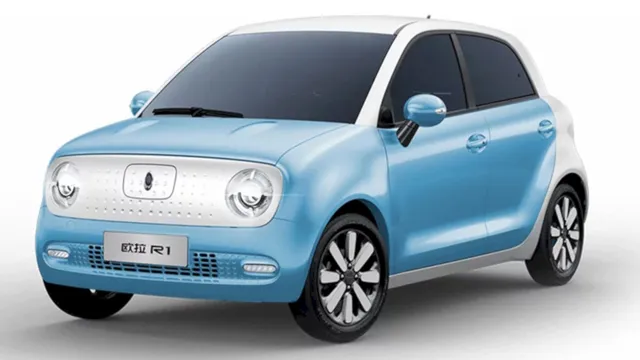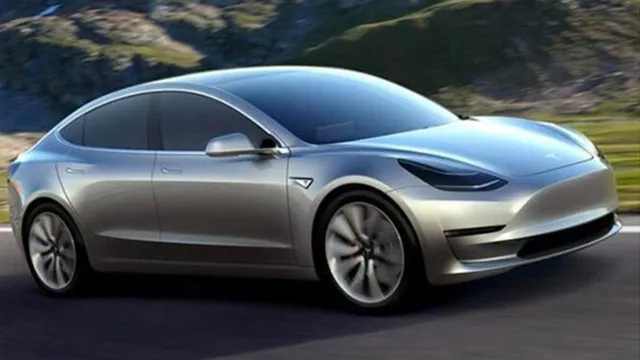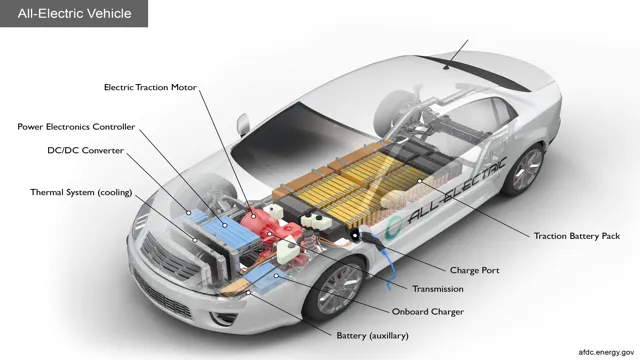Revolution on Wheels: How Electric Cars are Disrupting the Automotive Industry
Electric cars – a new breed of vehicles that operate entirely on battery power, is the future of personal transportation. As the world continues to move towards sustainability, electric cars have emerged as one of the most innovative and cutting-edge solutions, providing environmentally-friendly alternatives to traditional gas-powered vehicles. Electric cars are becoming increasingly popular, and it’s easy to see why.
With zero emissions, they are environmentally-friendly and promote clean air. Additionally, they are quieter and smoother to drive, with lower maintenance costs than their gas-powered counterparts. The shift towards electric cars is already happening, with major car manufacturers investing billions of dollars in developing electric cars to meet the demand of the market.
While electric cars may present some challenges, like limited range and longer charge times, advancements in technology are rapidly addressing these issues. We can expect to see more charging stations and longer-lasting batteries in the near future, making electric cars a more practical and convenient option. The benefits of electric cars are immense, and they will continue to play a huge role in shaping the future of personal transportation.
Whether you’re an eco-warrior or simply looking for a more efficient way to get around, electric cars are an excellent choice. So, if you haven’t already, consider making the switch to an electric car and help pave the way for a cleaner, greener world.
Disrupting the Automotive Industry
Electric cars have completely disrupted the automotive industry in recent years. Once seen as a niche market, electric vehicles (EVs) are increasingly becoming mainstream as more and more consumers turn to them as a way to reduce their carbon footprint and save money on gas. This surge in demand has led to traditional car manufacturers scrambling to produce their own electric models to compete with new players in the market like Tesla.
As the technology behind EVs continues to improve, their appeal will only increase, making them an inevitable part of the future of the automobile industry. With the government globally imposing strict regulations on emissions, the shift towards electric transportation is a necessary move in the direction of environmental sustainability. The shift towards electric cars will undoubtedly continue to disrupt the automotive industry for years to come, with new innovations and developments driving the change.
Rising Popularity of Electric Cars
Electric cars are rapidly gaining popularity, disrupting the automotive industry. This eco-friendly alternative to traditional petrol or diesel-powered vehicles is becoming increasingly accessible to the average consumer. With the development of better battery technology, electric cars can now last longer on a single charge and provide a more sustainable driving experience.
More and more car manufacturers are now investing in electric car production, offering a wide selection of models to choose from. The electric car trend is not just limited to individuals, as large corporations and government sectors are also taking advantage of this opportunity. It’s no surprise that people are jumping on board the electric car movements, given its positive impact on the environment.
The rise of electric cars has proven that sustainability and practicality can go hand in hand.

Market Size and Growth Projections
As the world transitions towards electric and autonomous vehicles, the automotive industry is being disrupted at an unprecedented pace. The global electric vehicle market size is projected to reach $8081 billion by 2027, continuing its impressive Compound Annual Growth Rate (CAGR) of 2
6%. Simultaneously, the self-driving car market is expected to grow at a CAGR of 61% from 2020 to 2030, reaching a value of $
6 trillion. These numbers showcase the massive potential for disruption within the automotive industry and a significant shift towards sustainable transportation. With bold initiatives, innovative technologies, and the drive towards a cleaner environment, the industry is poised to transform in ways never seen before.
As we move towards an autonomous driving era, innovation and technology will continue to be the driving force behind the evolution of the automotive industry.
Benefits of Electric Cars
Electric cars are a disruptive technology that’s gaining in popularity as people become more aware of its benefits. One major advantage of electric cars is that they produce zero emissions, making them environmentally friendly. This is a significant benefit as fossil fuels contribute heavily to climate change.
Additionally, electric cars are more energy efficient than gas-powered vehicles, saving drivers money on fuel costs. With the growing number of charging stations being built, range anxiety is also becoming less of an issue. In terms of maintenance, electric cars have fewer moving parts, meaning they require less servicing and repairs.
While the initial cost of buying an electric car can be higher than gasoline cars, the money saved on fuel costs and maintenance could make them more affordable in the long run. Electric cars are here to stay and are quickly becoming a popular choice for environmentally conscious drivers looking for a sustainable and cost-effective mode of transportation.
Environmental Impact of Electric Cars
When it comes to the environmental impact of electric cars, one of the main benefits is their low carbon footprint. Unlike traditional cars that run on gasoline, electric cars do not emit harmful pollutants into the atmosphere. This means that electric cars can help reduce air pollution, which can have a significant impact on human health.
Additionally, electric cars can help reduce greenhouse gas emissions, which are one of the leading causes of climate change. By using more renewable energy sources, such as wind and solar power, to charge electric cars, we can further reduce our carbon footprint. In short, the benefits of electric cars go beyond just saving money on gas – they can also help us protect the environment and create a greener, more sustainable future for us all.
So, if you’re looking for a way to reduce your carbon footprint and live a more eco-friendly lifestyle, consider making the switch to an electric car!
Cost Advantages for Consumers
When it comes to electric cars, one of the biggest benefits for consumers is the potential cost savings. Electric cars are generally cheaper to operate and maintain than traditional gas-powered vehicles. With electric cars, you can avoid the high and volatile prices of gasoline, and instead charge your car for much less.
Additionally, electric cars have fewer moving parts than gas-powered vehicles, resulting in lower maintenance and repair costs. This can be a huge advantage over time, particularly for those who regularly rely on their cars for transportation. Not only can you save money on fuel and maintenance, but many states also offer tax incentives and rebates for purchasing electric cars.
Overall, the cost advantages of electric cars make them an appealing option for those looking to save money without sacrificing performance and style.
Performance and Efficiency
Electric cars have continued to gain popularity as an alternative to gasoline-powered vehicles over the years. One of the most significant benefits of electric cars is their performance. Electric cars provide instant acceleration due to their electric motors’ torque, providing a smooth and quiet ride.
They can go from 0 to 60 mph in a matter of seconds, offering a thrilling driving experience. Additionally, electric cars do not require traditional gearboxes, making their ride smoother; they also provide a lower center of gravity, allowing for better handling around corners. Furthermore, electric cars are more energy-efficient than gasoline-powered vehicles, providing a better driving range with less energy.
This efficiency ensures a lower carbon footprint, making them a more environmentally friendly option. Electric cars’ rechargeable batteries allow drivers to charge them at home conveniently. Therefore, electric cars offer a cost-effective solution, reducing the cost of automobile designs and reducing servicing costs.
In summary, electric cars provide several benefits. They are eco-friendly, cost-effective, and come with impressive performance capabilities that offer a comfortable driving experience.
Challenges and Limitations
Electric cars are undoubtedly a disruptive technology with the potential to revolutionize the automotive industry. However, there are still significant challenges and limitations that must be addressed before these vehicles can become mainstream. One of the biggest challenges is the high cost of electric cars, which can be prohibitive for many consumers.
Additionally, the infrastructure needed to support widespread use of electric vehicles, such as charging stations, needs to be improved. Range anxiety is another hurdle, as drivers may be hesitant to adopt electric cars if they worry about how far they can travel before needing to recharge the battery. Despite these challenges, the benefits of electric cars, including their lower emissions and efficiency, make them a promising solution for the future of transportation.
As more research and development are done, these limitations will continue to be addressed, with the result being a more sustainable, eco-friendly, and cost-effective mode of transportation for everyone.
Infrastructure and Charging Network
As electric vehicles (EVs) become more popular, infrastructure and charging networks must keep up with the demand. However, building the necessary infrastructure poses several challenges and limitations. One of the main challenges is the high cost of building and maintaining charging stations.
Installing fast-charging stations in large numbers requires significant investments, which will take time to see returns. Additionally, there are limitations in the availability of charging locations, particularly in more remote areas, where it may be difficult to install the power supply and other necessary infrastructure. Furthermore, there are currently various types of charging plugs and connectors, which can be confusing and inconvenient for drivers.
As EVs continue to gain popularity, a standardized charging system would help alleviate this challenge. Another factor is the burstiness of charging habits, with many drivers charging their vehicles in the evening when they return from work, which can strain the power grid. To overcome these challenges, governments, utilities, and the private sector must work together to build more charging infrastructure, standardize charging technology, and encourage a more diverse charging profile to prevent overloading the grid.
Keyword: charging network.
Limited Driving Range
Electric vehicles have certainly come a long way, but a major challenge they face is limited driving range. While some electric vehicles have ranges of up to 400 miles, others can only go up to 100 miles before needing a recharge. This can be a major issue for drivers who need to travel long distances or who live in areas where charging stations are scarce.
However, advancements in technology are helping to extend driving ranges. For example, some electric vehicles have regenerative braking systems that help recharge the battery while driving, and there are now more charging stations available in cities and along highways. Additionally, manufacturers are developing new battery technologies that promise longer ranges and faster charging times.
While limited driving range is still a concern, the industry is working on solutions to this challenge.
The Future of Electric Cars
Electric cars are a disruptive technology that promises to fundamentally change the way we transport ourselves and goods. With advances in battery technology and the growing demand for sustainable transportation options, electric cars are poised to become the norm in the not-too-distant future. Electric cars offer a number of benefits, including lower emissions, lower operating costs, and a quiet, smooth driving experience.
As more people switch to electric cars, the demand for gas-powered vehicles is likely to decline, and the infrastructure to support electric cars will continue to expand. While there are still some challenges to overcome, such as range anxiety and the high cost of batteries, the future of electric cars looks bright, and it’s an exciting time to be a part of this emerging industry.
Conclusion
In conclusion, electric cars are no longer just a concept of the future, but a disruptive technology in the here and now. They have the potential to revolutionize the way we think about transportation and energy consumption, not to mention the positive impact on the environment. Naysayers may argue that the infrastructure and technology to support electric cars is not yet fully developed, but progress is being made every day.
After all, the future is electric, and it’s time to charge up and join the ride.”
FAQs
What are electric cars and why are they considered a disruptive technology?
Electric cars are vehicles that run on electric motors and batteries instead of gasoline. They are considered disruptive technology because they have the potential to drastically change the automobile industry, reduce greenhouse gas emissions, and increase energy efficiency.
How do electric cars impact the environment?
Electric cars have the potential to reduce greenhouse gas emissions and air pollution. Since they run on electricity, they emit no tailpipe pollutants and their overall carbon footprint is much smaller than traditional gasoline-powered cars.
What are the advantages of owning an electric car?
Owning an electric car can save you money on gasoline, maintenance, and tax incentives. They also have fewer moving parts than traditional engines, so they require less maintenance.
What are the challenges of owning an electric car?
One of the main challenges of owning an electric car is finding charging stations. They also have limited driving ranges, so long trips can be difficult. Additionally, they can be more expensive to purchase upfront.



